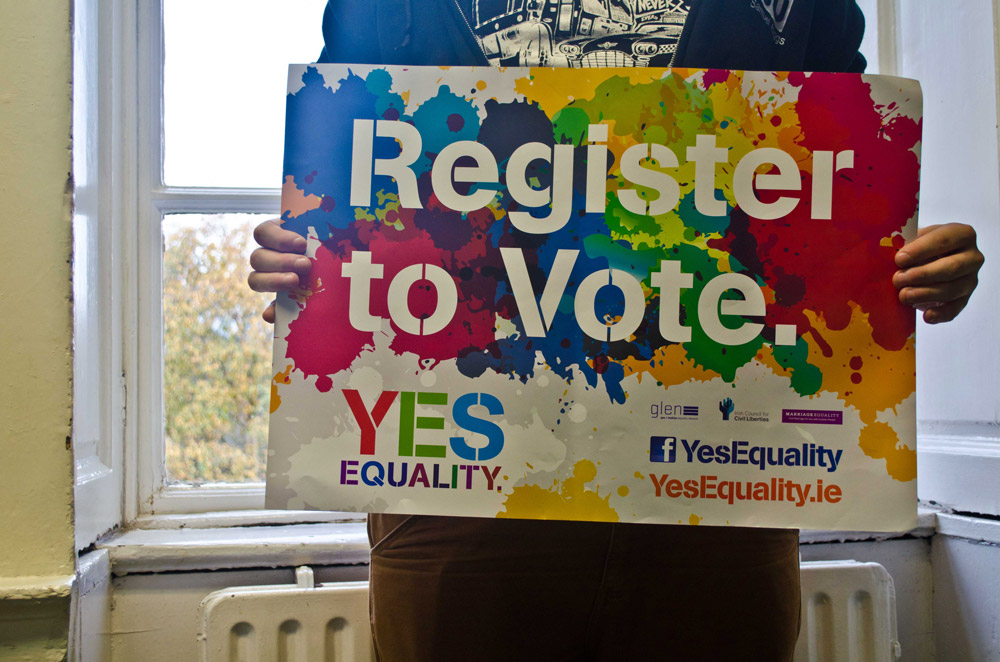Sinéad Baker and Edmund Heaphy
The Union of Students in Ireland (USI) this morning outlined their position on voter registration reform, arguing for the introduction of online voter registration, and for the consideration of automatic voter registration – saying that political parties need to take the youth vote seriously.
The paper, officially launched this morning, talks of the importance of young people continuing to engage with politics after the marriage equality referendum. USI President, Laura Harmon, said that USI, from registering almost 28,000 students to vote in conjunction with its member students’ unions and LGBT societies, “learnt a lot along the way” about the inadequacies of Ireland’s voter registration system. The youth vote’s importance in the referendum has been widely acknowledged, Harmon said, referencing the extremely high turnout from the supplementary register in the polling station used by Trinity students.
Speaking at a press event this morning, James Upton, Deputy President and Campaigns Officer of University College Cork Students’ Union (UCCSU), said that the voter registration system has been “fractured by lack of clarity that has existed from the roots”. UCCSU registered over 3000 students to vote in the run-up to the referendum. “Some councils accept the forms in bulk in one envelope, while others require them to be individually enveloped”, Harmon said, referencing what the position paper refers to as “troubling inconsistencies” in how local authorities process completed voter registration forms and the confusion many experienced about the overall process of registering to vote – including confusion over key dates, deadlines and what address people should use to register.
Online voter registration, currently in use in the UK (excluding Northern Ireland) and 20 US states, was recommended by a joint Oireachtas committee in 2008. It would “significantly ease accessibility for many wishing to register to vote”, the USI paper says, and PPS numbers could be used to individually identify voters and prevent fraud.
The paper also urges the Department of the Environment, Community & Local Government, which is partly responsible for voter registration, to launch a feasibility study into automatic voter registration for when a citizen turns 18.
Referencing a lobby held by USI in conjunction with member student unions last week, Harmon noted the high turnout – with over 70 Oireachtas members in attendance – and said it was a recognition of the increased political capital that young people have. “Political parties need to take the youth vote more seriously”, Harmon said. “They need to engage with the youth vote when writing their manifestos”.
The paper also advocates voting rights for citizens who are abroad, stating “many of those who have left have the desire to play a role in their state and a country they wish to return to”. The paper states that voting at Irish embassies or consulates abroad should be introduced, removing the need for those abroad to return back to Ireland to vote.
USI are also advocating the publication of guidelines on processing voter registration forms from the Minister, in order to standardise the various approaches taken by local authorities, as well as an information booklet to be sent to those who have recently become eligible to vote.
USI also notes the confusion around the RFA2 voter registration form, which contains a “confusing” reference to the “local Garda station”, and recommends the removal of the requirement of Garda stamp on forms, which “appears to obviate the possibility of temporary concessions to facilitate registration in other locations” such as College campuses.
USI also supports the extension of voting rights to those aged 16–18, as in countries such as Scotland and Switzerland. The paper urges the government make the holding of referendum on this issue a priority, noting the resolution passed at the Constitutional Convention in 2013.
The paper is critical of checktheregister.ie, a website where citizens can check their registration status, due to the time it takes for the website to be updated, causing “significant anxiety” for those who wished to vote. It recommends that the website be made largely the responsibility of the Department of the Environment, Community and Local Government.
Photo by Sinéad Baker for The University Times







